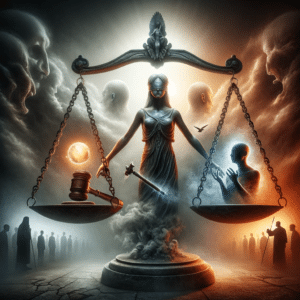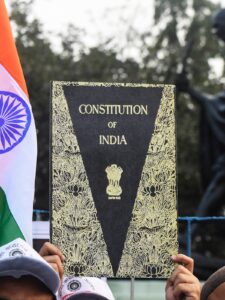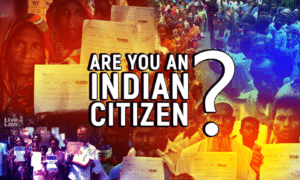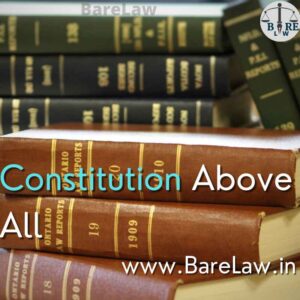Simplifying Your Life & Law | Legal Drafting services
Authored by : Sejal Makkad and Nikhil Parakh
THE MARATHA RESERVATION
In the world’s largest democratic country, the Government of Maharashtra by the virtue of the Maharashtra Reservation for socially and Educationally Backward Classes (SEBC) Act, 2018 extended the reservation to the Maratha community in public education and employment.
JAI SHRI LAXMANRAO PATIL’s CASE
The petition was filed challenging the same before the Hon’ble Supreme Court, then the constitution bench in the case named Jaishri Laxmanrao Patil v. Chief Minister struck down the Act of 2018 and held that ‘there were no extraordinary circumstances to grant reservation to Maratha community over and above the 50 percent ceiling on reservation prescribed by the Supreme Court in the year 1992 judgment in Indra Sawhney v. Union of India.’ Further, the court gave a reason that the Act of 2018 violates the principles of equality, and exceeding the ceiling limit of 50 percent violates Articles 14 and 15 of the Constitution. The ruled that the judgment in Indra Sawhney v. UOI is a good law and does not need to refer it to a larger bench and emphasized that there is no case of the extraordinary situation for exceeding the ceiling limit of 50 percent for grant of reservation to Marathas over and above the 50 percent,”
The state agency argued that since the population of backward classes is around 85% and the reservation limits to only 50% then the increase in reservation limit qualifies the extraordinary circumstances. The constitution bench disagreed with pleadings made by the state and stated that the Maratha community is the dominant forward class of the nation and is part of the mainstream of National life, therefore at no point can it be justified in extraordinary circumstances.
VALIDITY OF INDIRA SWHNEY’s CASE
The Bombay High Court upheld the validity of the Act by stating that the Indra Sawhney rulings do not impose any State’s legislative power to exceed the reservation ceiling of 50% in deserving cases in extraordinary circumstances. Further, the court held that 102nd Amendment inserting the Article 342A does not deprive the state of its power to specify the socially and educationally backward classes in the state’s list and held that such restrictions are only applicable on the lists of SEBC prepared by the Central Government. The support was taken by the Justice Gaikwad commission Report.
ISSUES BEFORE THE SUPREME COURT
The appeal was filed challenging the same before the Hon’ble Supreme Court. Several issues were raised before the Hon’ble Supreme court.
Firstly, Whether the SEBC Act of 2018 granting 12 percent reservation for the Maratha community in addition to 50 % of social reservation is covered under exceptional circumstances?
Secondly, whether the 102nd Constitutional Amendment Act deprived the State Legislature of its power to enact legislation determining the SEBC?
THE JUDGEMENT
Then the constitution bench in the case named Jaishri Laxmanrao Patil v. Chief Minister answered to the issues raised and struck down the Act of 2018 and held that ‘there were no extraordinary circumstances to grant reservation to Maratha community over and above the 50 percent ceiling on reservation prescribed by the Supreme Court in the 1992 judgment in Indra Sawhney v. Union of India.’ Further, the court gave a reason that the Act of 2018 violates the principles of equality, and exceeding the ceiling limit of 50 percent violates Articles 14 and 15 of the Constitution. The Court thereafter held that the 102nd Amendment did take away the state’s power to identify the backward classes and only the president is empowered to notify a list that identifies them which Parliament can amend thereafter however the State had liberty to give the suggestions but the ultimate decision has to be taken by the President only. The court ruled that the judgment in Indra Sawhney v. UOI is a good law and does not need to refer it to a larger bench and emphasized that there is no case of the extraordinary situation for exceeding the ceiling limit of 50 percent for grant of reservation to Marathas over and above the 50 percent,”
The state agency argued that since the population of backward classes is around 85% and the reservation limits to only 50% then the increase in reservation limit qualifies the extraordinary circumstances. The constitution bench disagreed with pleadings made by the state and stated that the Maratha community is the dominant forward class of the nation and is part of the mainstream of National life, therefore at no point it can be justified in extraordinary circumstances. The number or percentage cannot stand aground for increasing reservations above the ceiling level. It will violate the rights of people not covered by this population.
The Marathas comprise only 32% of the population in the state. Despite this, they have been in various positions. There has not been a deprivation of the community. If this would have been the case, they might have not occupied 40% of positions in the State Assembly since 1960. This clearly shows that the community has built up and no stringent steps have been taken against it. The quota of “Socially and Economically Backward Class” is not for the people who notice sudden deprivation in their positions.
OBITER DICTA
The reasoning that has been given by the court is that no sufficient cause has been found for granting reservation. The findings show that a sufficient number of Marathas are enrolled in the universities. Also, they hold positions such as IAS, IPS officers. The number of such enrolments shows that there is no sufficient cause for believing that Marathas are backward from the general category. This reservation would also have violated the 50%ceiling rule. The non-grant of this reservation stands as a step forward for removing unnecessary reservations from the country. Also, the reservation was done based on Justice Gaikwad Commission Report, which was held to be having no adequate reasoning. The report failed to justify the backwardness of Marathas in the state. The lack of reasoning, scientific, and absence of data for the same fueled the decision of the Supreme Court. The passing of the act for reservation has also been questioned. It’s necessary to follow the procedure for bringing the act into power. The absence of the procedure also makes the act not authoritative for imposing reservations.
If people of all the classes approach the court for granting reservation for some or other reason, there will be a “general category” left. This will also remove the effect of reservation in the actual sense. The people who are genuine need reservations will lose hope. However, at present, various schemes have been implemented by the Government that works for looking after different sections of society. Reservation is not the solution for everything. In the general category also, not everyone gets posted in the same position. It also depends on a person’s hard work. Everything cannot be leftover reservations.
IMPORTANCE
This judgment is also important for showing that states cannot use their powers in a way that obstructs the whole nation. Presently, the Marathas have been blaming the State Government for not trying hard for their reservations. Such allegations on the state government are also not valid. The formation of groups for promoting such reservations is also against societal norms. All such activities need a full stop. The people in the country cannot misuse the rights given to them. The opposition of the order of Bombay High Court by the Supreme Court on several valid points shows that the reasonableness that the apex court confers is very much required.
The reference is made to the “dark future of Marathas” as just an agenda to put pressure on the courts and governments. It is necessary to safeguard the basic structure of the Indian Constitution. If such reservations would be provided, it would crumble the rule that has been continuing for a long time. Therefore, the Indian Judiciary also has to safeguard the Constitution from being devastated. However, the fight is still not over, the reservations that had been earlier provided by the State Government will provoke the community. Such provocations are a threat to society.
IMPACT OF THE JUDGEMENT
Presently, for reviewing the verdict of the Supreme Court, a committee has been formed in the state. The state will submit the observations on May 31. The question that mainly arises is, will this verdict also change the Reservation scenarios in other states? The states where reservation is adobe 50% can also be questioned. However, the situation for “extraordinary” reservations has not been proved by the Maratha Community. Because of this, the extension in the reservation limit will deprive the rights of general categories. Also, there has not been a shortage of jobs and education in the Maratha Community.
The main issue is to look after the changes that the verdict will impose in the country. It could be on the brighter side as unnecessary reservations would be stopped. Also, it gives rise to a hope that from now onwards proper criteria will be decided for granting reservation. It does not seem that this will in any way affect the reservations that have been provided till now. Also, will benefit the general category as no more “categorization” will be made against them.
Particularly considering the Economically Weaker Section, this matter is way apart from the EWS. The reservation for EWS was done through a constitutional amendment as that was the need of the hour. If the comparison would be made to them, there are several reasons to prove Marathas unreasonable. The after-effects of the verdict will interestingly be positive as well as negative. Positive because there will be known unrequired reservations. Negative because the verdict might give rise to the cold war within the country. The report that will be submitted by the committee will portray the effect on the Maratha community.
You may also like to read:
-
28 May 2021 OpinionIs Capital Punishment against the principle of Natural Justice?
-
16 Aug 2021 Know Your LawThe preamble to the Constitution of India
-
19 Aug 2021 Know Your LawCitizenship laws in India
-
11 Sep 2021 Know Your LawSuicide and Mental Health laws
-
09 Sep 2021 Know Your LawCONCEPT OF LEGAL AID IN INDIA
-
12 Sep 2021 Know Your LawConstitution above all







